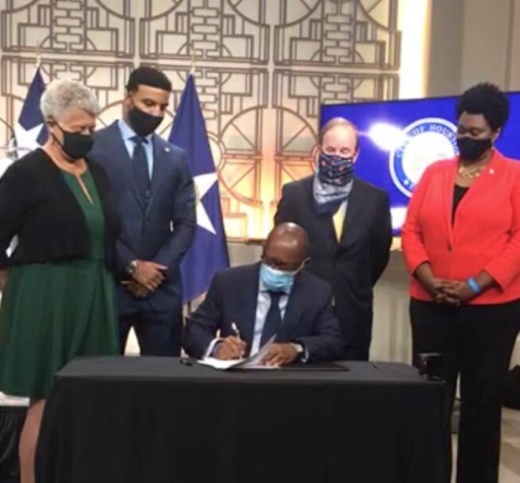Mayor Sylvester Turner signed an executive order Sept. 28 formalizing the policy so that during his and future administrations, it will remain under the mayor’s discretion rather than under the police chief.
“We have 5,300 police officers covering 640 square miles," Turner said. “The question is how can we best utilize them and their time while simultaneously protecting the community.”
The policy, which follows guidelines established by Harris County, applies to possession of under four ounces of a controlled substance, criminal mischief costing less than $750 in damages, graffiti causing less than $2,500 in damages, theft or theft of service valued less than $750, and driving without a license.
It does not apply to non-Harris County residents or to those on probation or parole or with outstanding warrants.
Offenders cited under the new policy will still have to appear in court, Turner said, but will not be brought to the Harris County jail.
“A person who has a minor offense, when you take away their car because of the situation, when they have to spend a night in jail because of the situation, when they miss a day of work because of the situation, the cost to the individual far exceeds the cost to the city,” said Judson Robinson, president and CEO of the Houston Area Urban League.
HPD estimated that 3,000 cases in Houston would have fallen under the policy if it was in place in 2019.
Several criminal justice reform advocates are calling to question the amount of discretion given to police officers under the policy. A coalition of groups including the Houston Right 2 Justice Coalition, the Texas Organizing Project and Black Lives Matter Houston issued an open letter Sept. 27 stating that the order needed to be strengthened to make a lasting impact.
“The fact that the presentation provided no mention of any models or recommendations they received while crafting this program, raises many questions around HPD’s attempt to engage activists and coalitions in the process of imagining this policy,” the letter read.
The letter stated that the policy’s 16 exemptions and discretion given to police officers on a case-by-case basis suggest that it is too lenient to be effective.
Individual police officers will have discretion when applying the policy, but they must receive permission from superiors and file reports explaining each exemption, Houston Police Chief Art Acevedo said.
In response to those who oppose the policy and believe it will reduce accountability while increasing crime, Turner said he and Acevedo aimed to strike a balance.
“There will always be those who say you went too far, and those who say that you didn’t go far enough,” Turner said.
HPD will publish a monthly report on the policy, Acevedo said, that will include data on the race and ethnicity of offenders as well as the numbers of those who are exempted from the policy and still taken to jail. Turner said he and HPD will use the reports as well as crime trend data to adjust the policy as necessary.
“This is not a matter of being soft on crime,” Acevedo said. “It's a matter of being smart on crime.”
The policy action comes after calls for criminal justice reform amplified after Houstonian George Floyd’s death in Minneapolis police custody. Houston’s police reform task force, formed after Floyd’s death, is expected to host a press conference about its recommendations to the mayor as soon as Sept. 30, Turner said.





